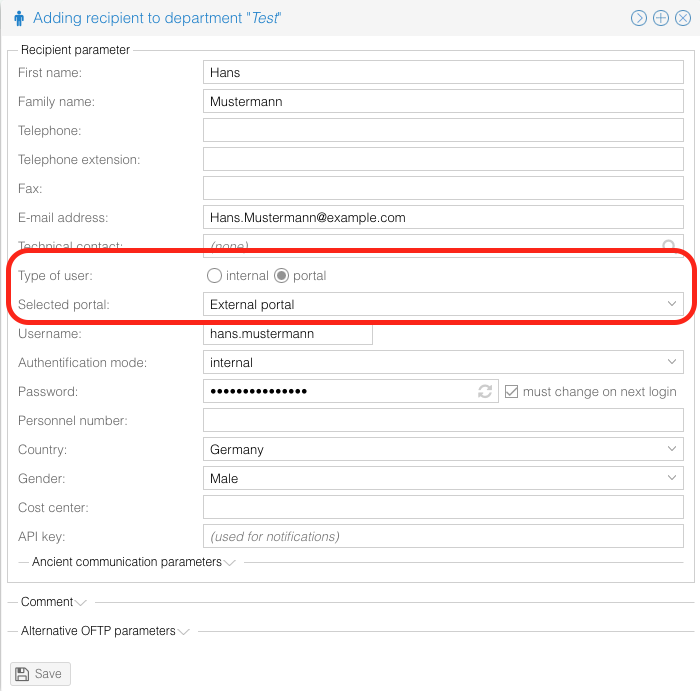Difference between revisions of "OS4X Portal - user management"
Jump to navigation
Jump to search
| Line 1: | Line 1: | ||
= Synchronized entities = | = Synchronized entities = | ||
When entities are synchronized to an external OS4X Portal server, the following configuration is important: | When entities are synchronized to an external OS4X Portal server, the following configuration is important: | ||
| − | *All internal entities which are defined below the "[[OS4X_Core_configuration#define_own_company|own company" are synchronized to the target machine | + | *All internal entities which are defined below the "[[OS4X_Core_configuration#define_own_company|own company]]" are synchronized to the target machine |
| − | *All entities which are required outside of the "[[OS4X_Core_configuration#define_own_company|own company" are synchronized. A required entity is a recipient with a configured portal server. All entities above this recipient are synchronized. | + | *All entities which are required outside of the "[[OS4X_Core_configuration#define_own_company|own company]]" are synchronized. A required entity is a recipient with a configured portal server. All entities above this recipient are synchronized. |
= Synchronized attributes = | = Synchronized attributes = | ||
Revision as of 13:49, 8 April 2019
Synchronized entities
When entities are synchronized to an external OS4X Portal server, the following configuration is important:
- All internal entities which are defined below the "own company" are synchronized to the target machine
- All entities which are required outside of the "own company" are synchronized. A required entity is a recipient with a configured portal server. All entities above this recipient are synchronized.
Synchronized attributes
Only a subset of all available attributes is synchronized to a remote DMZ installation of OS4X Portal. These are:
Company
- primary key (idx)
- shortname
- longname
- active state
- comment
Location
- primary key (idx)
- partner reference
- description
- street 1 & street 2
- city incl. ZIP code
- active state
- comment
- DUNS value
- country reference
Department
- primary key (idx)
- location reference
- active state
- description
- country reference
- comment
Recipient
- primary key (idx)
- department reference
- name and surname
- telephone and facsimile number
- email address
- address code
- username
- for external users only: password in hashed form
- flag for password reset
- authentification type
- active state
- country reference
- gender
- comment
- user type (internal or portal user)
Adding new user
When adding a new portal user, the user has to be added in the internal zone only. The selected usertype ("portal") adds the portal selection for the target server. Per default, the first active portal is selected.
Synchronization rules
- When adding a new internal recipient, this recipient is synchronized to all active portals.
- When adding an external portal user, this recipient is synchronized to the target server only. If the hierarchy is not available at the remote OS4X Portal instance, it's being created dynamically.
- When deleting an internal recipient, this recipient is deleted at all active portals.
- When deleting an external portal user, it is deleted from the configured external OS4X Portal instance. If the above hierarchy is no longer required, it is deleted, too (so, empty departments are deleted; empty locations are deleted; empty partners are deleted).
- When reactivating a disabled recipient in the internal zone, it is being synchronized by the above rules.
The event "user created event" is helpful to manage newly created users with a dynamic password.
